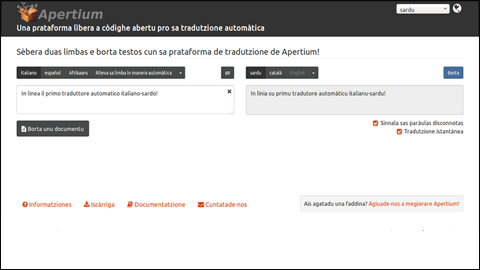Tradumàtica participates in the creation of the first automatic translation system for Sardinian

07/09/2016
The UAB research group Tradumàtica, specialised in technologies applied to translation and automated translation systems, has been working on the first automatic translation system for the Sardinian language.
This translation system was born thanks to a collaboration between Tradumàtica and Prompsit, a company from Alacant which manages the open-source machine translation platform Apertium. The project has also been financed by Google, through its Google Summer of Code programme for to researchers working on the development of open-source software.
In order to create the translation system, a corpus and dictionaries were created and the Sardinian version of Wikipedia was used as a reference, as well as several media channels. The system includes 25,000 words, a translation coverage of approximately 90% and an index of error per word of 10%.
At the moment, users will be able to translate from Italian into Sardinian. Future versions will be made to correct errors, create new rules and add new language combinations. In fact, Apertium's home page (translated into Sardinian thanks to a collaboration with the Sardware users group) includes a link so that users can alert of possible errors and propose new projects.
The translation software is available Apertium. Created by the University of Alacant in 2004 for the Spanish-Catalan language combination, Apertium currently offers some 40 languages, including Breton, Occitan and Basque. The software is based on a series of rules, and that makes it particularly appropriate for languages which are in the process of standardisation.
More information:
Tradumàtica
Apertium